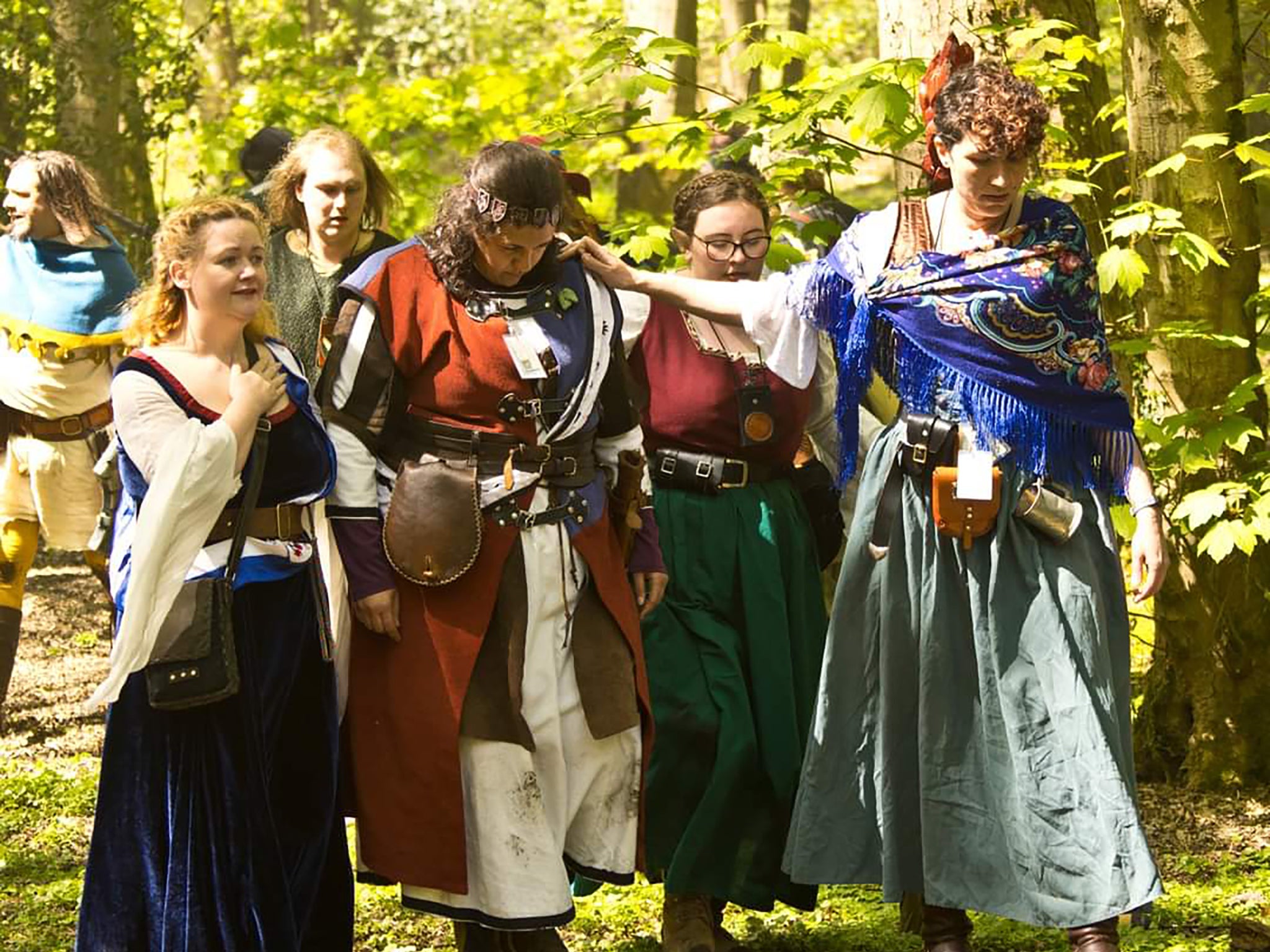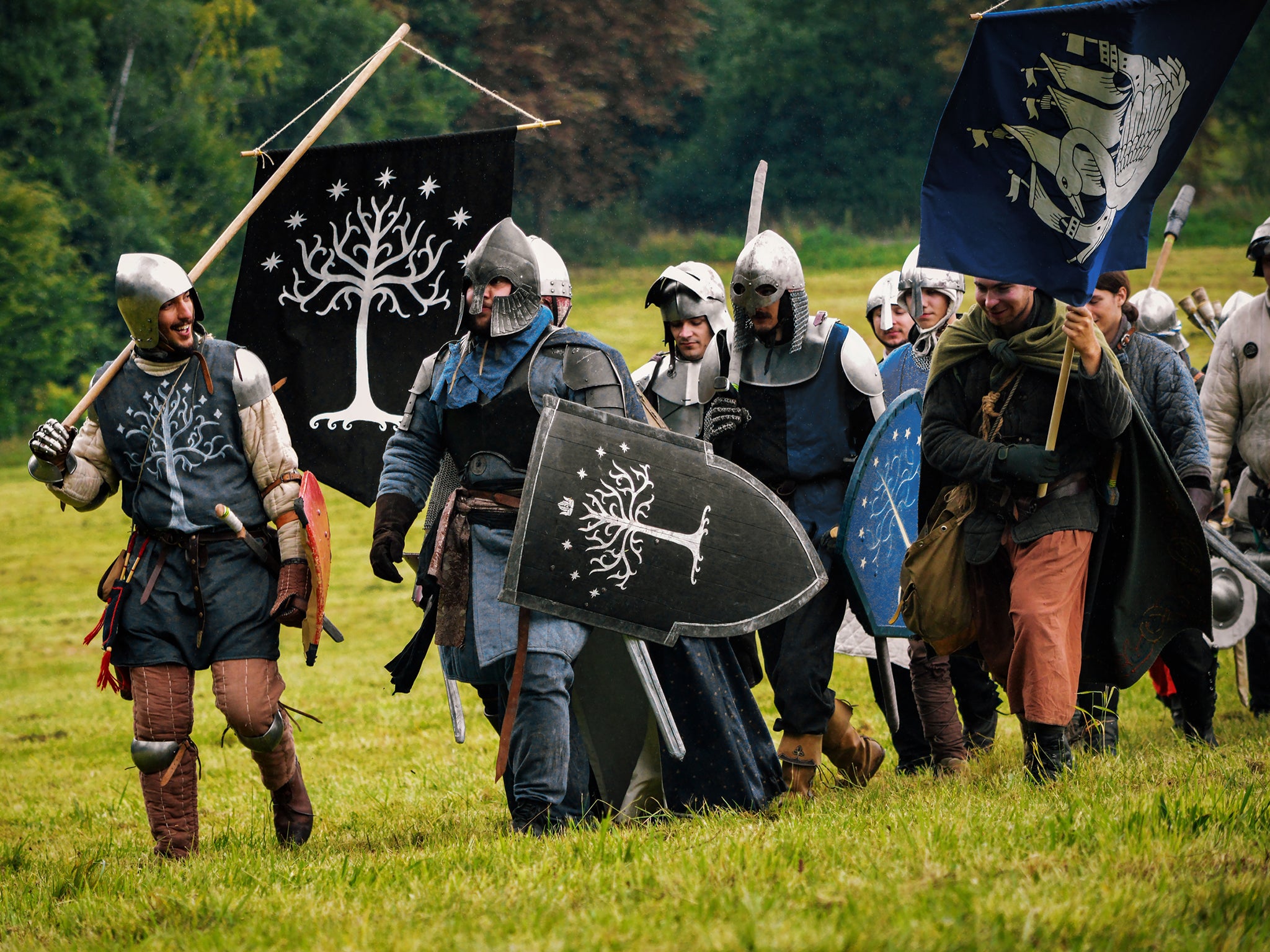Live and let larp: Playing a medieval ruler in a magical kingdom could change your life
In her downtime, Kate Townshend is a keen ‘larper’ – a little known and often misunderstood hobby otherwise known as ‘live action role playing’. She speaks to other devoted players about one of the most fun and challenging respites from reality


Your support helps us to tell the story
From reproductive rights to climate change to Big Tech, The Independent is on the ground when the story is developing. Whether it's investigating the financials of Elon Musk's pro-Trump PAC or producing our latest documentary, 'The A Word', which shines a light on the American women fighting for reproductive rights, we know how important it is to parse out the facts from the messaging.
At such a critical moment in US history, we need reporters on the ground. Your donation allows us to keep sending journalists to speak to both sides of the story.
The Independent is trusted by Americans across the entire political spectrum. And unlike many other quality news outlets, we choose not to lock Americans out of our reporting and analysis with paywalls. We believe quality journalism should be available to everyone, paid for by those who can afford it.
Your support makes all the difference.To “larp” is to be surrounded by ye olde tents on a scout site in the south of England, with no phone in your pocket but a candlelit tavern to your right, one selling every possible flavour of mead. Oh, and you’re also dressed in the flowing robes of an Arthurian queen, alongside close to a thousand other people in fancy dress.
This, if you’re still unclear, is a little-known and often misunderstood hobby called “live action role playing”, which I am first to admit has a bit of a PR problem. People tend to imagine ageing nerds with rubber swords and dubious social skills. But larp is actually fun, creative and intellectually challenging – and a blissful respite from reality. Between climate change, Brexit and a cost of living crisis, it’s easy to get depressed about the status quo, so why not dress up as a wizard, a knight or a princess to solve the problems of a fictional realm instead?
When I personally larp, I really do play a queen in a faux medieval setting, but I don’t come up with the world I find myself in – that’s decided by the writers and organisers of the game, who provide me with problems to solve and questions to consider. The goal of larping is to balance the needs of the group and confront prejudice and everyday difficulties in outlandish situations. Orcs, dwarves, humans and elves all have their own place in the game and all face varying levels of discrimination.
There are hundreds of different larp games being played in the UK right now, all involving hundreds of people interacting as their characters and exploring their own unique skills and backstories. Games stretch across genres, too – there are sci-fi larps and post-apocalyptic larps, even Jane Austen larps. My game system, Curious Pastimes, is what’s known as a “fest larp”, as its size and scope give it a festival feel. With its themes of heroes overcoming the odds and fighting for the future of the universe, it can be a genuinely effective tonic for resisting apathy and cynicism in your everyday life.
Player and game organiser Ness Askew agrees that there is something unique about larp that can rekindle feelings of social engagement. “Players are able to control their own story and adopt a heightened sense of agency,” she says. “They might be faced with a scenario where the narrative parallels real world issues. [They then] have to grapple with these challenges while, hopefully, considering the impact of their choices. I believe that this kind of empowerment can help counter feelings of helplessness or resignation; our actions and decisions can have a meaningful impact, both within the game and potentially in real life, too.”
This has certainly been the case for Ness. She credits her experiences in roleplaying with giving her the confidence to apply for a voluntary role as a magistrate. It’s a job that requires her to stand up for what she believes to be morally right. “Larp has instilled in me a deep sense of responsibility and a passion for making a positive impact,” she says. “It’s a safe environment for open conversations and experimenting with new approaches without any negative consequences in real life.”
Talk to a range of larpers and many speak of the same effect the game has had on them. Kay Thomas is a director at Curious Pastimes, and one of a number of people in charge of overseeing the game’s setting and plot, as well as managing the logistics of running events for large numbers of people. “The thing about larp is it shows you different ways of making an impact,” she explains. “There’s trial and error you can get away with. You can try the big, stupid ideas!”
Over the course of three events my character Simonetta was stabbed, interrogated, compelled to drink a truth serum, and threatened with immolation because of her beliefs
She’s also keen to point out the ways in which the hobby brings people together. “A key part of it is a lot of people working together to create something much bigger,” she says. “From the running of the event to the way players come together to deal with whatever’s thrown at them. You’re often working with characters in the game who are ideologically very different to you, in a way you might not be used to in the real world. But people learn how to make it work at larp.”
This collaborative element feels hugely important to me. Some of my favourite larp memories are of moments where players come together, whether to forge a sword, defeat a tyrannical king or sign a treaty between pretend nations. It’s easy to feel powerless as an individual, but there’s something almost magical about seeing what a group can create when they put their minds to it.
Ayla Toye, another larper who has played across a range of different games, says her life has been enriched by the variety of players she’s encountered so far. “Things [happen] to you while in character that draw you closer to people you would have possibly never considered socialising with before,” she says. “People from an older generation, people from a younger generation, queer communities, different professions. You start to make connections based on the person, rather than the ‘box’ society has put them in.”
Larper Anna Darnena says that even in-game discord can create real connections. “Over the course of three events my character Simonetta was stabbed, interrogated, compelled to drink a truth serum, and threatened with immolation because of her beliefs,” she recalls. “It feels counterintuitive to say that during this time I felt the most held by the game and its players. Those who attacked Sim for her views were also those who checked in with me out of character, making sure that I was OK.”

Perhaps because of these intense bonding experiences, there is a strong sense of community – and community responsibility – that surrounds larp. Social media pages allow people to fundraise or reach out for help, while larp support groups enable players to help one another in non-game activities, from fitness to charity. It’s as if seeing what can be achieved within the game also inspires people to cooperate outside of it, too.
Jackjak Stalley was one of the organisers of Elemental Links, a game designed in conjunction with a local Mencap group to be accessible for vulnerable adults. One of its goals was to teach social skills and problem-solving. “We had a few banquets where players learnt about resource management, and diplomatic missions where they had the chance to meet new people,” Jackjak says. Diplomacy is a common theme in lots of different types of larp games, with players learning about the art of compromise, or even improving their public speaking skills. “And,” recalls Jackjak, “we aimed to give them lots of ‘hero moments’ to show off their roleplay skills and creativity.”
We’ve talked recently about how we make the hobby more attractive to people of colour. We’re considering if some of our kit or make-up is culturally insensitive. We’re having conversations constantly behind the scenes to make things more inclusive and open
Further still, there is an increasing awareness in larp about the intersections between games and the real world. Ironically, it feels as if pretending to be someone else can actually help people be themselves. Paul Stephen Fraine runs the LGBTQ+ support group at Empire, another large fest larp, and tells me that larps allow people to be “free and supported to express [themselves]”: “Everyone is already ‘othered’ and going to ‘other’ themselves by going into character.”
It would be a fantasy of a different kind to pretend that larp is some sort of utopia – problems in society do, inevitably, follow people even into the game. But what keeps me hopeful is the way the hobby knows that it’s a work in progress. Kay says that there is a large movement in larp to make games more accessible for all. “Things like making documents accessible for people with reading differences, or considering how we create a welcoming space for people who are neurodiverse,” she says. “We’ve also talked recently about how we make the hobby more attractive to people of colour – people who aren’t historically larpers. We’re considering if some of our kit or make-up is culturally insensitive. We’re having conversations constantly behind the scenes to make things more inclusive and open.”
Ultimately, larp is about experimenting with ideas, so perhaps it’s unsurprising that a sense of social and political optimism underpins it all. All you have to do, really, is see past the silly costumes. Or instead embrace them!



Join our commenting forum
Join thought-provoking conversations, follow other Independent readers and see their replies
Comments